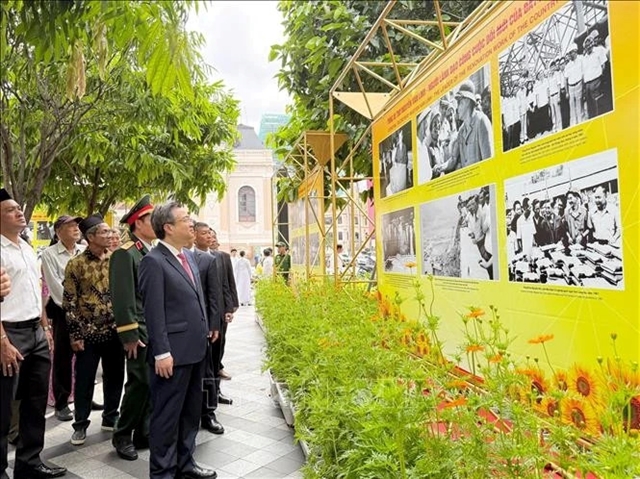

A short story by Kiều Bích Hương
 |
| Illustration by Đào Quốc Huy |
by Kiều Bích Hương
“New customers are coming, dad!” Demi called excitedly. Noel frowned, put a pile of bills into the drawer, rearranged his shirt collar, straightened its hems, and walked out.
The sunshine outdoors dazzled him, preventing him from seeing the customers clearly. Yet he caught Demi’s excitement. Later, after the customers left, he must scold her, Noel thought. Of course customers meant business, which was good. But they mustn’t wear their gladness on their faces like that when another person had passed away.
Three middle-aged chaps with burly bodies and distraught faces were standing wearily before Noel. Demi eagerly fetched some drinking water. Noel stretched out his hand toward the stoutest man to invite him to sit down. The tallest one nodded to greet Noel then went out to answer his phone. The remaining one, the youngest, thrust his hands into his pockets, and anxiously walked around Noel’s office eyeing the flowers and china vases. Noel didn’t worry too much about his customers’ attitudes. As usual, he sat down before them, and presented a face which showed a willingness to listen and understand.
“Hello sir. My name is Jeffery, just call me Jeff. My mother passed away last night,” the stout said. His 10 fingers knitted together as if to seek support. A vulnerable heart in a big chest, Noel thought silently, seeing right through the loving but awkward type.
“Please let me extend my condolences to you and your family,” Noel said. “Let us hope that there is a truly beautiful world which may also be called paradise. Your mother is going there soon. I hope to help your family take her there.”
“My mother disliked crowds, and feared noises,” the man said calmly. “We want the funeral to be as simple as possible. It should be big enough for about 20 people, and must be cosy.”
“How much does this chestnut-coloured china vase cost?” the guy who was walking around in the room suddenly asked.
At that moment Demi walked in with the drinking water, and answered for Noel:
“160 Euros, sir. We have many other kinds of vases, cheaper or more expensive. If you want, I can take you to the exhibition room to have a look.”
“This is Daan, my younger brother. The one who is talking on the phone outside is my older brother Hans. We can only take a break from work today, and want to have a funeral for our mother as soon as possible. All information about her, her portraits and family photos are saved in this disk. You can use them as needed,” Jeffrey said.
“Of course, let us take care of everything. Everything will be as your family wishes. But I need you to stay a little longer. I want to know what you guys think about your mother, what you remember most about her. You can be brief. Death announcement cards shouldn’t be long, but they should describe a person precisely,” Noel answered.
“What a difficult question. How can we describe our mother succinctly? We haven’t thought about this before,” Jeff said, again looking perplexed and miserable. “I only remember that in both my maternal and paternal families, only my mother had a tiny figure like an Asian woman. My dad died prematurely, but my mother was very strong. She was strong even in her decision to die recently. She went on a hunger strike for several months in the nursing home. Mother said she felt tired with life, and it was time for her to go. Her old age couldn’t be cured. The doctor also agreed not to make my mother suffer any longer. So we helped her by proposing an injection to end her life. But the court didn’t allow it. It was terrible to see the nurses bring her food only to have to carry it away untouched. Every month the nursing home still sent us food bills. My mother didn’t eat or drink, shrinking into a skeleton lying flat in bed...”
Jeff sobbed. Noel stood up and gave him a glass of water and patted his youthful big wide back which was shaking. Then Noel turned around and called out, “Demi, I need you here, right now.”
***
Noel remembered when he was 20, an embarrassed youth wearing a black redingote tail-coat and white gloves, bowing his head wandering inside the church like an idiot. Noel didn’t like his family’s funeral service business at all. He found it nonsensical that he had to inherit the trade, just because it created a stable source of income which made his life easy. In his heart Noel couldn’t help despising his father sometimes. Why hadn’t his father dared to escape the vicious circle? Why couldn’t he come up with something fresher, more exciting than bustling around spiritless corpses? Noel’s father only said, “If you kids feel bored, you can find other careers. I won’t blame you. But if you work for me, even for just one day, remember that you must make friends with the dead as though they were still alive, you must understand that the dead can still speak.” Yet at that time Noel needed money. He needed it as soon as possible, to take Germaine to Hawaii. Germaine dreamed about having warm sunshine enwrapping her body. Noel loved the freckles on Germaine’s face, which were as thin as the tails of clouds scratching and tearing away after a strong wind. Gently burying her feet into the warm sand, Germaine smiled, the freckles crashing toward a deep hole near her soft mouth. “Noel,” she said. “I want your family to organise a funeral for me. Let us hope that there is a truly beautiful world which may perhaps be called paradise. Just like Hawaii now. You must prepare a beautiful road to take me there.”
When he put down two periwinkle trees on the path leading to the farewell room, Noel realised that he didn’t want to take up any other profession other than his family’s business. Noel’s father agreed to invest all of his money for Noel to renovate the funeral home. They replaced the complex’s grey paint with orange, expanded the corridor and set up a screen and a projector. On the roof of the farewell room they installed a window to support a grey cement pipe as wide as a lamp chimney. In daylight the sun shone down through it, and at night electric lights beamed upward creating a brilliantly lit path leading from earth to heaven.
Noel put Germaine’s body under this sky well. Germaine wore a shirt with a small flower pattern and a round collar. Her eyes shut tight, her hands knitted into each other and lay right under her chest. A two-layer burlap blanket covered her body from the belly to the feet. Above Germaine’s head, in the two corners of the room there were two pots of snake plants and under her feet stood a vase of white orchids. Germaine’s relatives walked around her body, touched her hands lightly, kissed her forehead gently and whispered goodbyes.
In the corridor, the projector started to run and Germaine’s photos flowed slowly across the screen. The two bonsai bamboo bushes under the white screen shook and rustled every time somebody opened the door and entered. Germaine’s mother sat on the bench in the corridor, and struggled to keep her head up to stop the tears from pouring onto her cheeks. Noel walked up, and showed her a handful of incense sticks. “Please allow me to burn incense for Germaine after her cremation,” he said. “Germaine once said she wanted to get to paradise with such fragrance and thin smoke.” Germaine’s mother nodded and said, “You understand her better than me. Please do as you like. Thank you for writing these wonderful words for Germaine.” Noel’s father was standing by the door, handing out cards to those who came to see Germaine for the last time. The back of the cards showed a photo of Germaine smiling, wearing a wide brim bamboo hat that covered half her face, with the other half glowing under the sun. Inside the cards, Noel had stayed up all night the day before to print these lines: Don’t remember me on sad rainy days/Pray think of me when sunlight fills your heart.
***
Demi sat in front of a blank sheet of paper and bit incessantly at the head of a ballpoint pen. It didn’t help. She still couldn’t figure out how to describe the dead mother. She’d better stand up, walk out to water the snake plants, and trim the ivy vines that had been overgrowing densely all over the fence. The periwinkles and bamboo bushes were also waiting to be taken out to the yard to drink some sunshine. Noel was about to advise his daughter to take such a break when Demi suddenly exclaimed:
“I know how to write about this old woman who was determined to die!”
“Gosh, what a way of speaking. You can’t be in this profession if you continue to speak like that.”
“Don’t worry, her family isn’t here. You listen and tell me what you think, dad.”
Demi picked up her sheet and read aloud: “Mother/Six letters connect/I call in my heart/Paradise is near/Only a cradle swing from here...”
“That’s a rip-off of Ugo Verbeke’s poetry,” Noel said, frowning.
Demi put down her pen, and looked embarrassed.
“I changed the rhythm, but you still noticed.”
“That poetry doesn’t suit the old lady. I love this profession precisely because it challenges me to describe a person. Listen, strangers’ dead bodies are taken straight to us from the hospital. They lie here, though we don’t know anything about their lives. Yet they belong to us completely. We can call their names, and write about them as if we had known them for a very long time.”
“But I think it’s more difficult to write about somebody we know than about a stranger,” Demi said. “Do you know when I started to want to follow this profession? Perhaps you didn’t know how curiously I watched you write the card to announce grandpa’s death. I remembered him for having extremely strong, and at the same time, dexterous hands. I used to see him lift up coffins as easily as if they had been flower vases. I almost cried when he scolded you for misarranging a flower a little. Every piece of silk he used for the bedding for the dead seemed as soft and pleasant as clouds. Once I was scared to death when he turned red and lost his temper and showed a customer the door when that customer threw money on the table, and demanded grandpa to ask the church to ring the bell longer than usual for his dead wife. When grandpa passed away, I wanted to be the first to know, to read what you had written for him, about him. Do you still remember those words?”
The wrinkles on Noel’s forehead started to move. He pushed his glasses up his nose. Of course he remembered those words. Yet he wanted to hear them from his daughter. Demi understood, flung back her hair, crossed her arms before her chest, looked straight into her father’s eyes, and read proudly: “Critical but faithful! Devoted to the last breath/Respectful of himself was how father worked.”
Noel caught a glimpse of light blazing up on his daughter’s face, the same kind of light that flooded Germaine’s body in Hawaii in the old days. Perhaps the girl really loved the profession. He had been skeptical when Demi first gave up teaching. One day, the girl walked into his office which was located by the corridor that led to the farewell room and said hesitantly, “Can I work with you?”
That afternoon, though the doorbell rang, Noel didn’t hear Demi call his name. When he finished his work and walked out, he saw Jeff and his two brothers weeping, their bulky bodies shrinking up on the bench. Having tied her hair neatly behind her back, Demi sat up straight before the three men and read slowly:
“Sons,
You were lucky
To understand that
My hands were tired,
My feet were slow
My ears didn’t hear
My eyes didn’t see.
Sons,
I was lucky
Because you had patiently
Listened to my old stories many times.
Sons,
I was lucky
Because you had assured me
Though tears filled your hearts.
Sons,
I was lucky
Because you stayed with me longer when darkness started to fall
And took my hands when death came near.
Oh sons,
I am lucky
And will thank you by lightening up the stars in the sky…” VNS
Translated by Thùy Linh




